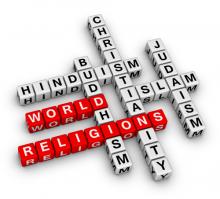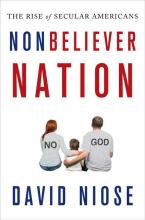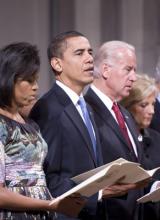Religion

WASHINGTON — Most Americans do not believe Scientology is a real religion, according to a recent poll by 60 Minutes and Vanity Fair.
The survey, conducted by CBS News, found that 70 percent of Americans say that Scientology is not a true religion; 13 percent believe it is; and 18 percent either don’t know or don’t care.
Out of the more than 1,000 people polled, Christian Americans were even more likely to question Scientology’s status as a religion — 79 percent of evangelicals, 74 percent of Protestants and 72 percent of Catholics surveyed responded that they did not think Scientology is a religion.
L. Ron Hubbard, a science fiction author, established Scientology in 1952, and the Church of Scientology has been acknowledged as a religion in the United States since 1993. Scientology is known for its celebrity followers, such as actors Tom Cruise and John Travolta.

Hester Prynne would be so proud.
The red letter “A” that Nathaniel Hawthorne’s heroine was forced to wear as a badge of shame in the classic novel The Scarlet Letter is now proudly chosen by atheists to wear on jewelry made from ceramic, silver, gold, and wood.
Christians have their crosses and crucifixes, Jews their Stars of David, Hindus their oms, and Buddhists their lotuses. Atheists ask, why shouldn’t they and other nonbelievers have their own symbols as well?
“It is the most recognized symbol in our community right now,” said Amy Roth, a Los Angeles atheist who makes ceramic "A" pendants for her “Surlyramics” jewelry line that she sells at atheist conventions and meetings, as well as online.

We’ve all heard the rhetoric. “We need to take America back for God!”
Why? Supposedly so we can regain some bygone level of ethics or moral standards. Supposedly, if we don’t, God will get tired of us “rebuking” God and remove God’s hand of protection from us. Supposedly, so God won’t test us or judge us or something.
Yet, as Gregory A. Boyd notes in his important book The Myth of a Christian Nation: How the Quest for Political Power Is Destroying the Church, taking America BACK for God assumes we were at one really belonged to God, followed God, listened to God. Boyd goes on to ask, when was this glorious age in the history of the USA?
Let’s start way back. We’ve been taught that many people migrated to North America for religious freedom. So was this glorious time when some of our forebears imprisoned, tormented, and/or hanged many suspected to be witches? Is that what so many want to take us back to?

The white working class, a potentially rich bloc of voters for Republicans or Democrats, hasn’t settled on Mitt Romney or President Barack Obama, a new study from the Public Religion Research Institute shows.
“These white working class voters are not particularly enamored of either candidate,” said Daniel Cox, PRRI’s research director. “In terms of their favorability, they’re both under 50 percent.” Forty-four percent look favorably upon Obama and 45 percent upon Romney.
Released seven weeks before the election, the August survey found Romney with a double-digit lead over Obama among the white working class, which preferred the GOP candidate 48 to 35 percent.
But Cox points out that the gap narrows to statistical insignificance among women voters in this group, and in the Midwest and West, home of several swing states. The upshot for Romney and Obama?
If they want to woo this group, which makes up 36 percent of the nation according to the study, the campaigns may want to consider other findings of the PRRI poll.

I’ve been reflecting on the recent events in Libya involving the death of Ambassador Chris Stevens, and every time, I arrive at a different feeling about it all.
There’s the obvious tragedy of a life unnecessarily lost. By all accounts, Stevens was a humble, passionate man who had invested his life in the betterment of the infrastructure for the Libyan people. He was not, as some dignitaries or diplomats tend to be, resting on his credentials in an easy gig, waiting for retirement. He was living out what he believed in a terribly volatile corner of the world.

Since the ban on international trade of ivory in 1989, the ivory black market has been on the rise, and a National Geographic investigation found that demand for religious art pieces carved out of the precious material has played a considerable role.
“No matter where I find ivory, religion is close at hand,” said investigative reporter Bryan Christy, whose article, “Ivory Worship,” is included in the new edition of National Geographic magazine, released Sept. 14.
“Elephant poaching levels are currently at their worst in a decade,” Christy wrote. The Convention on International Trade in Endangered Species of Wild Fauna and Flora (CITES) estimates that at least 25,000 elephants were poached in 2011, mostly for their ivory tusks.
Philippine Catholics use ivory to construct crucifixes, figures of the Virgin Mary and other icons. The province of Cebu is particularly known for its ivory renditions of the Santo Nino de Cebu (Holy Child of Cebu), used in worship and celebration.

The typical American underestimates how many Protestants there are in the U.S., and vastly overestimates the number of religious minorities such as Mormons, Muslims, and atheist/agnostics, according to a new study.
Grey Matter Research and Consulting asked 747 U.S. adults to guess what proportion of the American population belongs to each of eight major religious groups: Protestant, Catholic, Jewish, Mormon, Muslim, atheist/agnostic, believe in God or a higher power but have no particular religious preference, and any other religious group.
The average response was that 24 percent of Americans are Catholic, 20 percent are Protestant, 19 percent are unaffiliated, 8 percent are Jewish, 9 percent are atheist or agnostic, 7 percent are Muslim, 7 percent are Mormon and 5 percent identify with all other religious groups.

Jacques Berlinerblau wastes no ink in his new book trying to flatter his fellow nonbelievers.
"American atheist movements, though fancying themselves a lion, are more like the gimpy little zebra crossing the river full of crocs," he writes in How to Be Secular: A Call to Arms for Religious Freedom.
Ouch.
"In terms of both political gains and popular appeal, nonbelievers in the United States have little to show. They are encircled by cunning, swarming [religious] Revivalist adversaries who know how to play the atheist card."
Berlinerblau, a Georgetown University biblical scholar who teaches a course on secularism, wants to rescue that little zebra. But his plan may be a hard-sell with some atheists — he wants atheist groups to drop their black-and-white opposition to religion and its adherents in order to preserve the Constitution's guarantee of freedom of religion.
"The gimpy zebra remark was a little goofing on this over-the-top chest-thumping that emerges from Movement Atheists," he said in an interview, referring to atheist organizations with political goals, like American Atheists. "They wildly overestimate their numbers. They tend to overestimate the efficacy of their activism. They underestimate how disciplined and organized their adversaries in the religious right are, too."

Christian leaders asked, and the presidential nominees answered. The poverty rate in America is still at a staggering 15 percent and 46.2 million Americans remain in poverty — what is your plan to address the problem?
The Circle of Protection, composed of Christian leaders from across the religious spectrum, released President Barack Obama's and GOP nominee Mitt Romney's video responses today at the National Press Club in Washington, D.C.
(VIDEOS from Obama and Romney after the jump.)

I was home sick on Sept. 11, 2001. Amy had left for her grad school classes, so I was a little bit annoyed when she burst back in and woke me up.
“Turn on the TV,” she said. “Something bad is happening. Really bad.”
While watching the replayed video of the plane colliding with the first tower, the second tower attack came. And then there were the reports of similar attacks at the Pentagon and in Pennsylvania. At that moment, we had no idea when the bad news would stop coming. My first thought was for those loved ones I have in bigger cities, praying that they would not find themselves in harm’s way.
We watched the reports in silence for a few hours, trying to sort out what had just happened. Of course, there were no certainties about the attacks being over, but by now all planes had been grounded, and the American military was on high alert.
“I’m not sure how much more of this I can watch,” I told Amy, realizing it was nearly noon, and I was still sitting on the couch in my underwear. “We should try and do something.”
“Everything is closed,” she said. “Churches will probably have prayer services later, but not until tonight.” The zoo was the only thing we could find that was still operating, so we decided to go spend some time among some less self-destructive animal species. We settled by the gorilla habitat, where one lazy silverback leaned against the other side of the glass, just inches away from us. Though they usually tend to turn their backs to human observers, he was staring right at us. He seemed to be just on the verge of speaking:
What the hell is the matter with you people?

Why did Jesus have to die? Was it to appease a wrathful God's demand for punishment? Does that mean Jesus died to save us from God? How could someone ever truly love or trust a God like that? How can that ever be called "Good News?"
It's questions like these that make so many people want to have nothing to do with Christianity.
Countless people filling our pews have adopted this hurtful view of God and themselves. It has led many to internalize feelings of shame and self-loathing, thinking this is what God desires. Others have lost their faith entirely because of it, unable to worship a God who seems to them to be a moral monster. Faith motivated by fear, threat, and feelings of worthlessness. How could things have gone so wrong?
When did the good news become bad news?

Gotta say I’m a big fan of this church sign at my father-in-law’s church.
It’s time to STOP:
- Using faith, Jesus, and the Bible as a political platform;
- Cherry-picking from the Gospel based on what polls well;
- Claiming Jesus would be so myopic to identify with either of our major political parties;
...

UDATE: (Posted 9/6/12)
Criticized by Republicans and some members of their own party, Democrats voted to restore the word “God” to the Democratic national platform late Wednesday (Sept. 5). The GOP had seized upon the omission as a failure of their opponents to appreciate the divine's place in American history.
GOP vice presidential nominee Paul Ryan took to the airwaves early Wednesday to blast the change from the Democrats’ 2008 platform. “I guess I would just put the onus and the burden on them to explain why they did all this, these purges of God,” Ryan said on “Fox & Friends.”
Ryan also attacked the Democratic platform’s initial failure to affirm Jerusalem as the capital of Israel, an issue important to some American Jews and conservative Christians. After a voice vote at the party's convention in Charlotte, language about God and endorsing Jerusalem as the capital was added.
God is mentioned 12 times in the 2012 GOP platform. The 2008 Democratic platform made one reference to God: the “God-given potential” of working people. The 2004 platform had numerous references to God.
A court in Cologne, Germany, recently ruled that circumcising young boys represents grievous "bodily harm." The court found that the child’s "fundamental right to bodily integrity" was more important than the parents’ rights. According to the court, religious freedom "would not be unduly impaired" because the child could later decide whether to have the circumcision.
In response to the ruling, some Jews and Muslims who practice circumcision for religious reasons have protested vehemently. Subsequently, German politicians pledged to pass a law to protect ritual circumcision of young boys. Israeli Chief Rabbi Yona Metzger even traveled to Berlin to defend Jewish circumcisions, and a complaint against a Bavarian rabbi for performing circumcisions drew the anger of the Anti-Defamation League. The legal and cultural dilemma inherent in the issue makes prompt resolution unlikely.
Most of Germany (and the world) does not circumcise. It is instinctively viewed as harmful. Here's why...

[Editor's Note: David Niose is president of the American Humanist Association and vice president of the Secular Coalition for America, a group that lobbies on behalf of nontheist and secular Americans. In his new book, “Nonbeliever Nation: The Rise of Secular Americans,” he charts the development and growth of the religious right and what he sees as the increasingly organized response from Americans who are committed to the separation of church and state. Some answers have been edited for length and clarity.]
Q: You write about the 1912 presidential election as one in which all four candidates were sympathetic to evolution, science and religious skepticism. Today, a presidential candidate favors evolution at his or her peril. What’s changed?
A: What has changed is the environment of politics, particularly the level of political discourse. Thanks to the rise of the religious right, many candidates today actually emphasize their anti-intellectualism as a selling point to voters. Conservative Christians have always been part of the voter pool, of course, but only in recent decades have they been organizing and flexing their muscle as a voting bloc. Many candidates get mileage by pandering to conservative religion, by openly rejecting science and emphasizing their biblical literalist views.

There aren't any white Protestants on the presidential ballot this year — a first in American history.
Instead, the race features two Catholic candidates for vice president, and a Mormon Republican and African-American mainline Protestant for president.
Perhaps lucky for all of them, voters care more about issues such as social justice or gay marriage than they do about denominational brands.
That's particularly true for Republican Mitt Romney and running mate Paul Ryan, who hope to woo evangelical voters that share their values rather than their theology.
It's a situation that probably would have baffled famous evangelicals such as the late Rev. Jerry Falwell, who used the issue of abortion in the 1970s and 1980s to turn evangelicals into a powerhouse voting bloc among Republicans.
"If you had told Jerry Falwell back in 1980 that by 2012 that there would not be a white Protestant on the ticket — he would have died right there," said Shaun Casey, professor of Christian ethics at Wesley Theological Seminary in Washington.

The host city for the Democratic National Convention is not a particularly political place. Charlotte, N.C., is known for three things: banking, NASCAR, and religion.
And when it comes to religion, Billy Graham’s spirit looms large.
America’s most famous evangelist of the 20th century was born on a dairy farm just outside of town and was raised in Charlotte, home of his ministry.
For the Democrats – labeled disparagingly by some Republicans as the party of secular humanism – Charlotte is not a bad place to try and raise their religious profile.

The Rev. Sun Myung Moon, revered as a messiah within his Unification Church but regarded by many others as a vain and enigmatic man who blessed mass weddings, built a sprawling business empire and presided over a personality cult, died on Monday in South Korea. He was 92.
Moon had been in intensive care at a Seoul hospital since Aug. 7, according to his church. The cause of death was complications from pneumonia, including kidney failure.
Moon was born in 1920 in what is now North Korea, and rose from a home in which five siblings starved to death to become an ambitious man who harbored a lifelong hatred of communism, craved respect from the rich and powerful and professed a divine mandate to restore a fallen world.

Editor's Note: This is the fourth installment of Presbyterian pastor Mark Sandlin's blog series "Church No More," chronicling his three-month sabbatical from church-going. Follow the links below to read his previous installments, beginning in June.
- Church No More: Part 1 — Walking Away From Church
- Church No More: Part 2 — Church That Doesn't Steal Your Joy
- Church No More: Part 3 — The 'C' Word
- Church No More: Part 4 — I Don't Want to Go Back
A little over two months ago, I decided I'd spend my three-month sabbatical not going to church. Which might seem like a perfectly normal thing to do – except that I'm a minister. I've had some strange and wonderful experiences which I've written about, but possibly more strange and more wonderful than the experiences are the responses I've received.
From the very beginning the most frustrating response I get is not folks telling me I'll lose my faith if I leave church (and they have), or the ones telling me I can't begin to understand what it's like to be Spiritual But Not Religious (SBNR) in three short months (lots of those were also disturbingly aggressively worded), but rather the ones that say, “Oh, 'sabbatical!' Thanks. Now I have a word to call what I do! I stopped going to church years ago.”
“No!” I'd think while unsuccessfully trying to figure out how to reach through my laptop screen and shake some sense into them, “You are not on sabbatical! The sabbatical I'm taking about has to do with taking a rest, not leaving. It's rest and recuperation — communion with God in a way that is restorative. It's not about leaving! Sheesh.”
More than two months into my sabbatical, I now have to say, “Boy was I wrong.” They are on sabbatical, more so than I am.

Tony Jones has asked some of us progressive Theobloggers to chime in on God, you know, perhaps some kind of definition or doctrine (that word many of us progressives despise). You can read his invitation here. Tony doesn't want us to talk about Jesus, per se, but about God. I get that. He's in his evangelical context and he gets tired of all the Jesus talk. Lately it seems that the Emergent conversation has been all Jesus all the time. Now, that doesn't bother me, but then again I feel that in my end of the progressive mainline (free church progressive) we don't talk about Jesus enough. We talk about God all the time. Jesus, well, he's a bit of an enigma. What else is there to say? Nevertheless, Tony's invitation is an interesting one and I'm willing to chime in.
One caveat: I'm doing this as a way to speak of one Person of a Trinity. To speak of the One is, in many ways, to speak of the Three and the Unity. But this is just a blog post and not a 20-page essay. So ... yeah.
My answer: If you want to know God, get Religion. (Have you got good religion? Certainly, Lord!) Religion is a combined set of activities embodied by people. These activities are not limited to but may include the following behaviors: liturgy, charity, politics, and even theology (mystical and systematic), and doctrine. Religion can be communal or individual. Religion is the principal craft by which we know (cognition) and understand (hermeneutics) God.